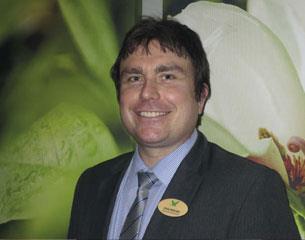The physical working environment has obvious attractions, but the parks offer other benefits for employees, says Margaret Mitchell, senior HR manager. “We didn’t set out to make it that way, but we know what our employees like and so, working at Center Parcs, they have access to discounted breaks and they do make the most of that for their family,” she says. “It’s a huge part of what we are.”
Employees can bring their families in on day passes and also have access to the leisure facilities, which include a swimming pool and gym. Staff also get a 20% discount at the villages’ retail and food and drink outlets. [Profile continues below]
As a short-break operator, Center Parcs averages 1.6 million guests a year. Since its first village opened in the UK in Sherwood Forest, Nottinghamshire in 1987, the organisation has been growing, and will open its fifth UK village in Woburn, Bedfordshire in 2014. Its diverse workforce includes lifeguards, retail assistants, housekeeping assistants, maintenance staff, beauty therapists and forest rangers.
Service and sustainability targets
Center Parcs sets customer service and sustainability targets for each village. A key benefit that helps the villages reach their targets is Shared Success, the organisation’s profit-sharing scheme, says Mitchell.
Introduced 11 years ago, the scheme is open to all staff with 18 months’ service. It pays a percentage of basic pay if certain targets are met. Each employee receives a personalised letter showing the business’s targets and results, as well as each village’s achievements. The payment is awarded each July.
Mitchell says the scheme is vital to engage Center Parcs’ varied workforce. “If you think about the Sherwood Forest village with 1,400 staff, the general manager is trying to achieve profit targets, guest service scores and a reduction in energy consumption,” she says. “She can’t do that without everybody working with her. Because of the way we’ve linked it [to targets], it is on everybody’s agenda.”
With energy consumption high on its agenda, last December Center Parcs launched a Home Energy pilot scheme that offers to match, in cash, any savings that employees make on their own personal gas, electricity and water usage over a 12-month period. Available to all staff, the scheme measures energy consumption via meters, and the employee that achieves the biggest energy reduction will be awarded £7,000 to spend on home improvements related to sustainability.
Relationships with suppliers
Center Parcs also utilises the nature of its business when rewarding staff. Although it doesn’t offer benefits through salary sacrifice arrangements, it makes use of its relationships with suppliers, says Mitchell. “Where other employers have salary sacrifice bikes-for-work schemes, we negotiate discounts with our cycle supplier [because] we buy thousands of bikes,” she says. “A few years ago, when we replaced all our beds, our procurement team negotiated a really good discount for staff.
“We always try to make the most of what we are, and what we are doing as a business.”
Mitchell says one of the quirkiest benefits at Center Parcs is a Christmas hamper for each staff member. This sort of tradition may have died out elsewhere, but Center Parcs staff appreciate the personal touch, she says.
“We choose the boxes every year and we put a selection together. It’s a small thing, but it is really valued and staff look forward to it.”
As with all employers, pensions auto-enrolment has been a key focus recently. Center Parcs’ staging date was 1 May 2013, with the first staff contributions taken in June.
Review pension offering
Mitchell says the organisation had to review its pension offering to prepare for auto-enrolment. It closed its previous group personal pension (GPP) plan to new joiners on 1 May 2013 and opened a new GPP.
“Membership of the previous plan was around 24%,” says Mitchell. “We expect to be auto-enrolling a significant number of people. The cost of keeping the existing plan open with such a sudden increase in membership was not really sustainable. We’ve reviewed it and made changes to some of the contribution levels.”
Under its previous plan, Center Parcs paid death-in-service benefits at 10-times salary to pension scheme members, who contributed to the premium. This has now been reduced to four-times salary. “We are satisfied that, at four times, it is marketable,” says Mitchell.
With work under way on Center Parcs’ fifth holiday village, Mitchell has been reviewing pay, benefits and communication. “Because this is a brand new venture in a brand new area, it was a chance to take stock of what we’ve got,” she says. “I’m happy to say we don’t have any significant problems.
“The biggest area we are focusing on is employee communications. We are trying to be smarter and make it more accessible. We are not a workforce that sits behind desks; as a lifeguard, you don’t have a PC in the swimming pool. A lot of businesses can reach a lot of people quite quickly. We don’t have that luxury, so we have to find alternative means.”
Weekly briefings
Center Parcs uses online publicity and weekly briefings to disseminate information to its staff across its four villages, as well as posters and roadshows, particularly around key issues such as auto-enrolment.
The pensions team recently ran roadshows around auto-enrolment at each village, says Mitchell. These included briefings in the staff diner, meeting the housekeepers off the bus that brings them to work with information, handing out flyers and holding specific drop-in sessions. “We work hard at trying to reach everyone and not just assume that the news has been cascaded down,” she says.
“We’ve also got text messaging now, which we use mainly as a prompt to say ‘don’t forget the pensions auto-enrolment briefing’.
“We try to take a thoughtful approach to benefits and communication. The directors have a communications forum once a year, so they go round and talk about anything, for example new initiatives. We don’t introduce a lot of third-party benefits because we have such a robust package. If we feel there is something missing, we will look into it.”
Growing business
Center Parcs is not naïve enough to think that a woodland setting is enough to attract and retain staff, but has found that its strong brand and continued growth is a strong pull for employees. “People see a business that grows and grows, and is known for being a good employer,” says Mitchell. “Last year we set about defining our employer brand and came up with a new strapline, ‘Flourish in the forest’, which describes our employer proposition.”
Center Parcs has a target of filling 80% of its promotion opportunities internally, and it largely achieves this, which can be attributed to its training and development initiatives. In May 2011, Center Parcs revamped its Aspire leadership development programme, which offers awards from team member to supervisor level, and then junior manager, a foundation degree and a BA degree. More than 400 staff have gone through the programme.
“The opportunities, the strength of the business, the benefits and the environment all add up to keeping people,” says Mitchell.
Center Parcs at a glance
Holiday operator Center Parcs sees about 1.6 million guests at its forest villages each year. It offers short midweek or weekend breaks all year round.
With high levels of occupancy (97% in 2012), the business is growing, with a new site opening in Woburn next year.
Center Parcs has operated in the Netherlands since the 1960s, but its first UK park opened in 1987 in Sherwood Forest, Nottinghamshire. Its Elveden Forest village opened in Suffolk in 1989, the Longleat Forest village in Wiltshire in 1994 and the Whinfell Forest village in Cumbria in 2001. Its UK headquarters are in Newark, Nottinghamshire.
Center Parcs has just under 6,000 staff and offers a range of employment opportunities, from housekeeping assistant to lifeguard. The average age is 36, but its oldest employee is 76.
The workforce is 70% female, and the average length of service is five years. However, 20% of the workforce has been with the organisation for more than 10 years.
Career history: Margaret Mitchell

Margaret Mitchell, senior HR manager at Center Parcs, has been with the organisation for 12 years.
Before joining the holiday operator, she worked at high-street fashion retailer Etam, first in HR administration before progressing to HR manager.
When Mitchell joined Center Parcs as a reward adviser, there was no reward team or function. Her biggest achievements so far have been creating and developing this function, as well as developing Shared Success, its profit-share scheme, to become an integral part of the business.
“We’ve now got a reward team, an analyst and an administrator, and it is working really well,” she says. “It’s a big part of employment; we offer a lot. We weren’t always very good at telling staff what they’ve got; now we’ve made great inroads.”
Case study: Chris Hickman, guest services manager

Chris Hickman has been at Center Parcs for most of his working life. He started as a lifeguard at the age of 16 and worked in various leisure divisions, progressing through positions such as supervisor, assistant pool manager and training officer.
He left Center Parcs for three years, then returned to take up the new role of guest services manager two and a half years ago. His main responsibilities are to deal with guest enquiries, and any concerns or frustrations they may have. The guest services department also acts as the communication service for all the villages, passing on details to relevant departments.
Hickman has two young children, and values day entry to the village highly as a benefit. “Being able to come in on a day pass and have my children go out to the safe play areas, visit the child entertainers,or go out on a pedalo, for example, is fantastic for me as a parent,” he says.
Key business challenges
- Center Parcs’ primary business objective is to grow its profit each year. Its sets itself challenging goals, such as guest services targets, each year and a sustainability challenge that will continue through to 2020.
- A key focus is the opening of its fifth UK site in Woburn, Bedfordshire, which is a £250 million project which involves many staff, while making sure the opening does not distract it from the successful running of the rest of the business.
The benefits
Pension
- Legacy group personal pension, closed to new joiners: minimum employer contribution 4.5%; staff contribute 3%.
- Group personal pension for all staff to meet auto-enrolment duties: minimum employer contribution 1% and staff contribution 1%; option to upgrade to 8% from employee and 7% from employer.
- Death-in-service benefit: two-times salary for all employees, four-times salary for pension scheme members.
- Income protection associated with pension plan.
Healthcare
- Voluntary health cash plan.
- Employee assistance programme.
- Occupational health on site.
Cars
- Company cars for senior managers.
Work-life balance
- Flexible working patterns.
- Bus for travel to and from work for housekeeping staff twice a week.
- Car-sharing initiatives.
Holidays
- 30 days, including bank holidays.
- Extra holiday is given after two, five and 10 years’ service.
Other benefits
- Staff diner with subsidised meals.
- Social committee.
- Inter-village competitions.
- Voluntary benefits scheme.
- 20% discount in retail and food outlets.
- 25% discount off villa bookings.
- Profit share schemes.
- One-off payment for employees that take on an extra role, such as first aid or fire warden.
- Star Performer recognition scheme.
















